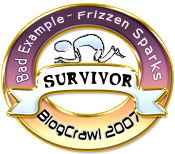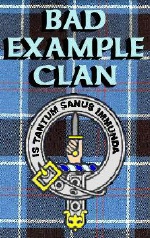August 16, 2005
Bootlegging... denied!
After doing much research and with a couple of tips via e-mail, this is what I've found via the BATF.
Budwieser actually had a good article on it, and I couldn't paraphrase it better, so I'm copying what they said:
Distillation of Alcohol and StillsUnder Federal rules administered by ATF, the legality depends on how you use a still. You may not produce alcohol unless you qualify as a distilled spirits plant (see ATF FAQ's page at their web site.) However, owning a small still and using it for other purposes is allowed. You should also check with your State and local authorities - their rules may differ.
A still is defined as apparatus capable of being used to separate ethyl alcohol from a mixture that contains alcohol. Small stills (with a cubic distilling capacity of a gallon or less) that are used for laboratory purposes or for distilling water or other non-alcoholic materials are exempt from our rules. If you buy a small still and use it to distill water or extract essential oils by steam or water extraction methods, you are not subject to ATF requirements. If you produce essential oils by a solvent method and you get alcohol as a by-product of your process, ATF considers that distilling. Even though you are using and recovering purchased alcohol, you are separating the alcohol from a mixture -distilling.
Under regulations in part 170 of title 27, Code of Federal Regulations, ATF has the right to require manufacturers of stills to give them the name and address of each customer. If they choose to impose this requirement, they inform the manufacturer of the stills by letter.
Some people are under the misconception that all home alcohol production is illegal. Below are the legal guidelines for home production of beer and wine.
Sec. 24.75
Wine for personal or family use(a) General. Any adult may, without payment of tax, produce wine for personal or family use and not for sale.
(b) Quantity. The aggregate amount of wine that may be produced exempt from tax with respect to any household may not exceed:
(1) 200 gallons per calendar year for a household in which two or more adults reside, or
(2) 100 gallons per calendar year if there is only one adult residing in the household.
(c) Definition of an adult. For the purposes of this section, an adult is any individual who is 18 years of age or older. However, if the locality in which the household is located has established by law a greater minimum age at which wine may be sold to individuals, the term ``adult'' will mean an individual who has attained that age.
(d) Proprietors of bonded wine premises. Any adult, defined in Sec. 24.75(c), who operates a bonded wine premises as an individual owner or in partnership with others, may produce wine and remove it from the bonded wine premises free of tax for personal or family use, subject to the limitations in Sec. 24.75(b).
(e) Limitation. This exemption should not in any manner be construed as authorizing the production of wine in violation of applicable State or local law. Except as provided in Sec. 24.75(d), this exemption does not otherwise apply to partnerships, corporations, or associations.
(f) Removal. Wine produced under this section may be removed from the premises where made for personal or family use including use at organized affairs, exhibitions or competitions, such as home winemaker's contests, tastings or judgings, but may not under any circumstances be sold or offered for sale. The proprietor of a bonded wine premises shall pay the tax on any wine removed for personal or family use in excess of the limitations provided in this section and shall also enter all quantities removed for personal or family use on ATF F 5120.17, Report of Bonded Wine Premises Operations.
(Sec. 201, Pub. L. 85-859, 72 Stat. 1331, as amended (26 U.S.C. 5042))
(Approved by the Office of Management and Budget under control number 1512-0216)
[T.D. ATF-299, 55 FR 24989, June 19, 1991, as amended by T.D. ATF-338, 58 FR 19064, Apr. 12, 1993; T.D. ATF-344, 58 FR 40354, July 28, 1993]This was last updated on September 17, 1999
Sec. 25.205
Production of Beer(a) Any adult may produce beer, without payment of tax, for personal or family use and not for sale. An adult is any individual who is 18 years of age or older. If the locality in which the household is located requires a greater minimum age for the sale of beer to individuals, the adult shall be that age before commencing the production of beer. This exemption does not authorize the production of beer for use contrary to State or local law.
(b) The production of beer per household, without payment of tax, for personal or family use may not exceed:
(1) 200 gallons per calendar year if there are two or more adults residing in the household, or (2) 100 gallons per calendar year if there is only one adult residing in the household.
(c) Partnerships except as provided in Sec. 25.207, corporations or associations may not produce beer, without payment of tax, for personal or family use.
(Sec. 201, Pub. L. 85-859, 72 Stat. 1334, as amended (26 U.S.C. 5053))This was last updated on September 17, 1999
Sec. 25.206
Removal of beerBeer made under Sec. 25.205 may be removed from the premises where made for personal or family use including use at organized affairs, exhibitions or competitions such as homemaker's contests, tastings or judging. Beer removed under this section may not be sold or offered for sale.
(Sec. 201, Pub. L. 85-859, 72 Stat. 1334, as amended (26 U.S.C. 5053))Sec. 25.207
Removal from brewery for personal or family use.Any adult, as defined in Sec. 25.205, who operates a brewery under this part as an individual owner or in partnership with others, may remove beer from the brewery without payment of tax for personal or family use. The amount of beer removed for each household, without payment of tax, per calendar year may not exceed 100 gallons if there is one adult residing in the household or 200 gallons if there are two or more adults residing in the household. Beer removed in excess of the above limitations will be reported as a taxable removal.
(Sec. 201, Pub. L. 85-859, 72 Stat. 1334, as amended (26 U.S.C. 5053))
That means there will be no making of whisky in my house. I kind of figured as much, but now I know. This sucks as I was starting to really want to try it out.
Posted by Contagion in Re-enacting life. at August 16, 2005 12:56 PM | TrackBackWhat if you just change the name? "I had myself some 'corn juice' this morning!"
Posted by: That 1 Guy at August 16, 2005 06:54 PMWhat if you just do it and not tell anyone....
Posted by: Graumagus at August 16, 2005 08:20 PMJust make some really stiff wine, or maybe something like Sam Adams' Triple Bock 18% sneaks right up on you.
Posted by: Chuck at August 16, 2005 08:30 PMI'm not about to intentionally break a federal law, plus I think the stench coming out of my backyard in the middle of the city would give me away. Distilleries don't exactly smell purty! :)
Posted by: Contagion at August 16, 2005 08:31 PMCorn Juice! LOL!
Posted by: Bou at August 16, 2005 09:46 PMYeah, like the scatastrophy in your basement DID?
Posted by: Graumagus at August 17, 2005 12:05 PMYou know, there ARE times you can just take my word for things. I told you it was illegal to make distilled beverages.
My grandmother used to make wine, beer, and soda. I asked my Dad why she never made anything harder, he said "because it's against the law". Simple enough for me.

 "
" 







